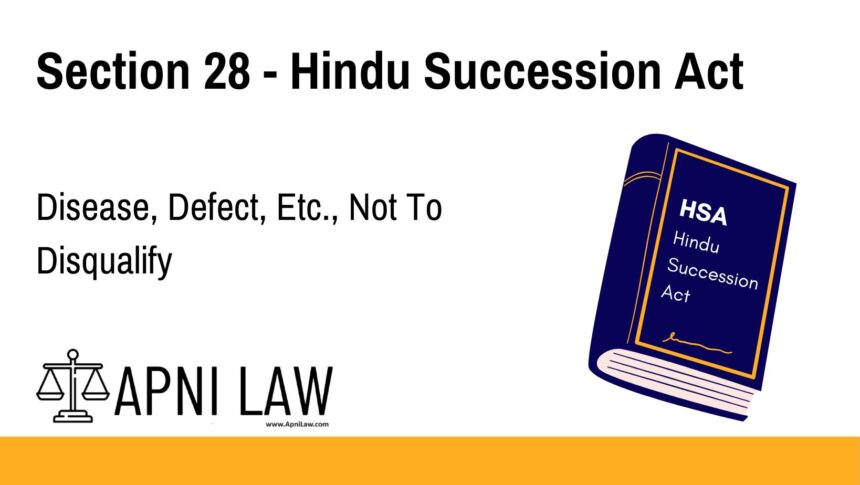Code: Section 28 – Disease, Defect, Etc., Not To Disqualify
No person shall be disqualified from succeeding to any property on the ground of any disease, defect or deformity, or save as provided in this Act, on any other ground whatsoever.
Explanation of Section 28 of the Hindu Succession Act
Section 28 of the Hindu Succession Act, 1956 ensures that no individual is disqualified from inheriting property due to any disease, defect, or deformity they may have. This provision emphasizes that unless a disqualification is specifically outlined in the Act (e.g., for crimes or conversion), a person’s health condition, appearance, or physical impairment will not be a valid reason to prevent them from inheriting property.
Key Points:
- Inclusive Inheritance: All heirs, regardless of physical conditions or health issues, are entitled to inherit property unless there is a specific disqualification under the Act (such as those described in Sections 25 or 26).
- Equality of Rights: This section upholds the principle that the right to inherit property is based on familial relationships, not on physical or medical conditions, reinforcing the fairness of the succession laws.
Illustration
Example 1: Physical Disability
Suppose an individual has a disability or deformity but is otherwise eligible to inherit property under the Hindu Succession Act. Section 28 ensures that the individual will not be disqualified from inheriting due to their physical condition. They will inherit just like any other eligible heir.
Example 2: Disease Does Not Disqualify
An individual suffering from a chronic disease is entitled to inherit property. As per Section 28, the disease will not serve as a disqualification unless otherwise provided for in the Act.
Common Questions and Answers on Section 28 Hindu Succession Act
1. Can a person be disqualified from inheriting due to a disease or disability?
No. Section 28 explicitly states that no person shall be disqualified from succeeding to property due to any disease, defect, or deformity.
2. Are there any exceptions to this rule?
The only exceptions are those that are specifically outlined in the Hindu Succession Act, such as disqualifications for murder (Section 25) or conversion to another religion (Section 26).
3. Does Section 28 apply to all heirs?
Yes, this section applies to all heirs under the Hindu Succession Act, ensuring that individuals with diseases or physical defects are not excluded from inheritance.
4. How does this support fairness in property succession?
This provision ensures that property inheritance is based on legal entitlement and family ties, not on a person’s physical condition, promoting equal rights among all heirs.
Conclusion
Section 28 of the Hindu Succession Act upholds the principle of fairness by ensuring that no person is disqualified from inheriting property based on their health condition or physical appearance. This reinforces the idea that inheritance is based on family relationships, not on personal attributes. The section contributes to equal inheritance rights for all heirs, regardless of disease, defect, or deformity.
For more insights into Hindu Succession laws, including the disqualification clauses or property rights, visit ApniLaw — your trusted legal resource.








